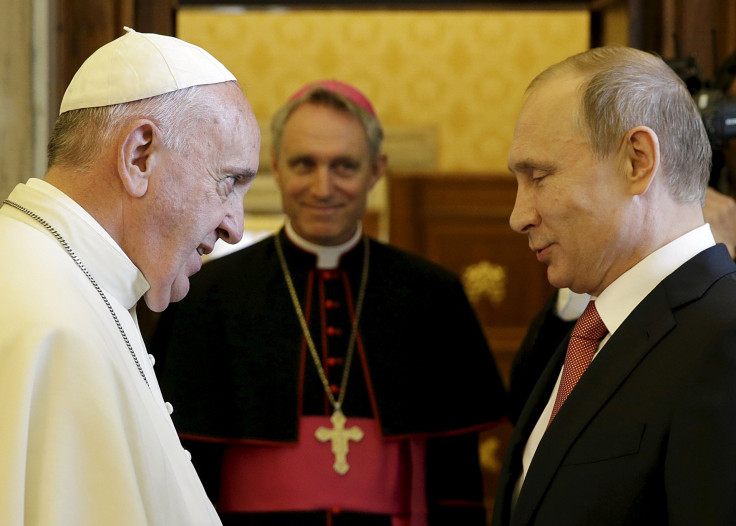Putin Vatican Visit: Pope Francis Urges Russian President To Make A 'Sincere Effort' At Peace In Ukraine

Pope Francis urged Russian President Vladimir Putin to make a “sincere effort” to achieve peace in Ukraine during talks at the Vatican on Wednesday. The pontiff also pushed Putin to allow access for humanitarian aid during the meeting, Vatican spokesman the Rev. Federico Lombardi said.
"The Holy Father stressed that there has to be an important and sincere effort to achieve peace [in Ukraine]. There was agreement on the importance of rebuilding an atmosphere of dialogue and that all the parties commit to applying the Minsk [ceasefire] accords," read a statement released by the Vatican shortly after the 50-minute meeting, Agence France-Presse reported.
The diplomatic tone of Francis' entreaties will not likely please observers who had hoped for a more forceful stance from the Vatican on the conflict. The Church has taken a cautious approach to criticizing Russia since the annexation of Crimea in March 2014 and the subsequent violence in eastern Ukraine, a conflict that has left over 6,400 people dead while severely straining Moscow’s relations with the West. Pope Francis has instead framed his condemnation of the hostilities as a denunciation of what he called a “war between Christians,” while calling for dialogue as the “only possible path to peace.”
Ahead of Wednesday’s meeting, a top American diplomat urged the Catholic leader to take a harder line on the conflict. The face-to-face discussion with Putin would be a good opportunity for the Vatican to voice its “concerns on territorial integrity,” said Kenneth Hackett, the U.S. ambassador the the Holy See. “Maybe this is an opportunity for the Holy Father to privately raise those concerns,” he added.
The pope has also been under pressure to take a tougher stance against Russia’s actions in eastern Ukraine by Ukrainian Catholic officials, who have expressed their disappointment at Francis’ careful language on the issue. “As sons, we always expect more from the Holy Father,” said Archbishop Sviatoslav Shevchuk, the leader of the Ukrainian Greek Catholic Church, adding that the pope’s labeling of the conflict as a fratricidal one was reminiscent of “Soviet propaganda.” Many Ukrainians reject the idea that the conflict is a civil one, instead viewing it as a campaign of foreign aggression sponsored by Russia.
On the other hand, the Vatican has worked slowly to build up its diplomatic ties with Russia following decades of hostility between the Kremlin and the Church during the Cold War, when the Soviet Union was officially an atheist state. The two established full diplomatic relations only in 2009, after a visit to the Vatican by then-President Dmitry Medvedev.
Francis met with Putin for the first time in November 2013, prior to the annexation of Crimea, in a discussion that centered on the conflict in Syria. Despite international condemnation, Moscow has maintained its support for the regime of Syrian President Bashar al-Assad. The pontiff used the meeting as an opportunity to press Putin to take a more active role in protecting Christians in the region.
That visit had also raised hopes of an improvement in relations between the Vatican and the Russian Orthodox Church, which have been strained over property disputes in Russia in the wake of the breakup of the Soviet Union. Both of Francis’ predecessors, Pope Benedict XVI and Pope John Paul II, had hoped to make history by being the first pope to visit Russia. It was not clear as of Wednesday afternoon whether Putin had extended such an invitation to Francis.
© Copyright IBTimes 2024. All rights reserved.






















